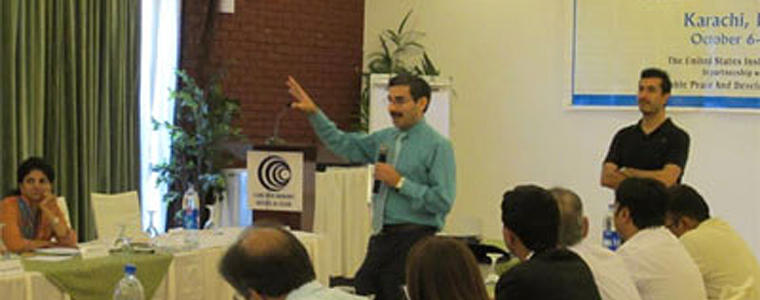In 2009, the Academy began a Training of Trainers (ToT) project to train Pakistanis in how to mediate and manage conflict non-violently. The Academy expanded the network into Sindh province in June 2011 with particular focus on Sindh’s capital, Karachi. USIP's Nina Sughrue reflects on her October 2012 workshop in Karachi.

When Linda Bishai and I were coordinating our trip to Pakistan in October to conduct an advanced workshop in Karachi, we were a bit apprehensive at first. It had been more than a year since the first USIP Academy workshop with the group and we did not know what to expect after so much time had passed. Would the group remember us? Remember the training? Be happy to see us or be disappointed we had not returned sooner?
In addition, security in Karachi was a concern. Karachi, the largest and most ethnically diverse city in Pakistan, is the economic hub of the country and is therefore essential to Pakistan’s long-term stability. Unfortunately the city has a high rate of violent crime ranging from kidnapping to target killings. According to the latest figures, approximately five people are brutally murdered every day on the streets of Karachi. The reason for the crime is a complex mix of political, ethnic and socioeconomic factors. Underpaid and understaffed law enforcement professionals are unable to keep up with the high level of criminal activity, and as a result citizens take security into their own hands, hiring security professionals and carrying weapons themselves. | Read about the complex conflict dynamics in Karachi [PDF]
The anti-Islamic video that ricocheted throughout the Islamic world only added to our concern, as did security issues concerning American troops in Afghanistan. However, those worries disappeared when we heard that 38 out of the 40 original participants would be attending. We knew then that the information taught over a year ago had been relevant and that the group was looking forward to our arrival in Karachi. With this information in hand, we were energized and ready to return. The 38 participants represented a wide variety of organizations: Agha Khan Foundation, Aurat Foundation, Bhittai Social Watch and Advocacy Khaipur, Citizen’s Police Liaison Committee, Customs Department of the Government of Sindh, Dawn Newspaper, Human Rights Commission of Pakistan, Indus Institute of Research and Education, Liyari Community Development Program, National Development Organization, Rotary Club of Karachi, Sindh Education Foundation, Sindh Graduate Association, Sindh Rural Partners Organization, Tehreek Minhajul Quran, Thardeep Rural Development Programme, the University of Karachi, Urban Resource Center, and World Learning Grammar School.
In 2009, the Academy began a Training of Trainers (ToT) project to train Pakistanis in how to mediate and manage conflict non-violently. The program began training professionals from the Afghan-Pakistan border region in the Khyber Pakhtunkhwa Province (KP) and the Federally Administered Tribal Areas (FATA). The goal is for the professionals to train others in conflict management skills as well as apply the information to the resolution of conflicts in their communities, organizations and families. To date, 95 Pakistanis have been trained in how to mediate and manage conflict non-violently. You can read about the KP and FATA participants here: http://www.usip.org/in-the-field/pakistan-training-the-mediators.
After close consultation with our local partner, the Sustainable Peace and Development Organization (SPADO), the Academy expanded the network into Sindh province in June 2011 with particular focus on Sindh’s capital, Karachi. The goal of the USIP/SPADO program is to develop a cross-sector network of conflict management professionals who are equipped to teach conflict management theory and skills as well as conduct, either directly or indirectly, non-violent conflict management interventions to counter the ever growing violence.
The October program was a success in a variety of ways. Advanced skills of communication, dialogue, negotiation, and mediation were taught and practiced, as was project design, where participants were taught the project design cycle and broken up into groups to conduct an analysis to identify a training need in their community (whom to train, what their existing capacities are, and a description of the gap between their existing capacities and what can be provided in training). The participants were then asked to work on the goals and the objectives of the program (decide what type of adult learning they are trying to achieve, and the goal and the objectives of the program) and to think about partnering with other organizations in order to increase resources and capacity. Participants left the workshop with training design work plans.
Perhaps more significant than the content of the workshop, the participants reconnected and developed deeper connections with one another. As one participant put it, “The most useful thing, apart from training trainers in conflict resolution, is meeting different colleagues and exchanging ideas and views.”
The next step with this program is to bring together the KP, FATA, Karachi and interior Sindh network members. This will be the first time that participants from KP and FATA will interact with participants from Karachi and interior Sindh. The purpose of this step is to build linkages among diverse conflict managers in Pakistan. Additionally, the workshop will focus on the issue of sustainability to ensure that the network continues to develop and grow with SPADO’s guidance.



